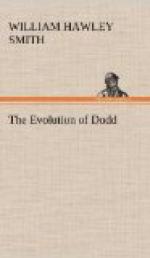I would by no means intimate that when a drunkard signs the pledge he is always lying and does not mean to keep it. On the contrary, I think the great bulk of those who thus write their names with a trembling hand, do, at the time of writing, really mean to keep all that they promise. But as a rule they change their minds when the trial comes, and “Don’t count this time!”
This statement is a sad one, but it is terribly true. There is a reason for it.
And the chief reason is that these “unfortunates,” as they are called, get into the habit of being carried when they should walk on their own feet. Your drunkard is always expecting sympathy, and help, and upholding. He leans down on you; he lies down on you. He pleads misfortune, disease, or something, and makes himself out a poor, weak victim of circumstances. He asks for help, and of a kind that most suits himself. He should not get such.
Help he should have, but of a kind that will make him help himself. Because, when such a person is merely helped by another he becomes helpless himself, and the last state of that man is worse than the first.
It was so with “Dodd” Weaver. The kind offices of Mr. Bright had really wrought him harm. He had thus been able to get money for some weeks, and as he lived only for the moment now, this “accommodation” kept him in his low mode of life.
It is the study of a lifetime how to deal justly with people in his condition. If you doubt my word, try it. You will be convinced.
“Dodd” did intend to do better after leaving Mr. Bright’s. But he went right down town and took a drink to brace up on. This also is common.
It was two days after this that the young man came once more to appeal to his benefactor. He was in trouble again, and according to the law I have just noted he came for relief to the source from which help had before come. There is no record of how long a man can thus abuse the kindness of a friend. Sometimes death alone ends the scene.
But Mr. Bright was not a man to be trifled with when once he had taken in the situation. He heard “Dodd’s” story with disgust. The young man had been drunk again, and in a brawl had struck an antagonist with brass knuckles. For this offense he said the police were in search of him, and would probably find him. He asked Mr. Bright to let him have money to pay his fine, and so keep him out of jail. He could not bear that disgrace, he declared.
But Mr. Bright was unmoved. He sat looking at “Dodd” for a moment in silence, and then said:
“Not one cent, young man!”
“But I shall have to go to jail,” faltered “Dodd,” in a broken voice.
“You may go there, and stay there, for all of me,” exclaimed Mr. Bright, in a burst of righteous indignation, as all the past years rose up before him and the memory of them floated before his vision. “I have given you the last cent that I ever shall. You deserve to go to jail, and it is probably the best thing that can happen that you should.”




